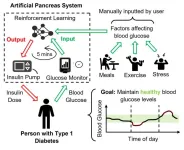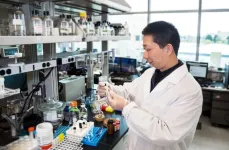(Press-News.org) The same type of machine learning methods used to pilot self-driving cars and beat top chess players could help type-1 diabetes sufferers keep their blood glucose levels in a safe range.
Scientists at the University of Bristol have shown that reinforcement learning, a type of machine learning in which a computer program learns to make decisions by trying different actions, significantly outperforms commercial blood glucose controllers in terms of safety and effectiveness. By using offline reinforcement learning, where the algorithm learns from patient records, the researchers improve on prior work, showing that good blood glucose control can be achieved by learning from the decisions of the patient rather than by trial and error.
Type 1 diabetes is one of the most prevalent auto-immune conditions in the UK and is characterised by an insufficiency of the hormone insulin, which is responsible for blood glucose regulation.
Many factors affect a person’s blood glucose and therefore it can be a challenging and burdensome task to select the correct insulin dose for a given scenario. Current artificial pancreas devices provide automated insulin dosing but are limited by their simplistic decision-making algorithms.
However a new study, published today in the Journal of Biomedical Informatics, shows offline reinforcement learning could represent an important milestone of care for people living with the condition. The largest improvement was in children, who experienced an additional one-and-a-half hours in the target glucose range per day.
Children represent a particularly important group as they are often unable to manage their diabetes without assistance and an improvement of this size would result in markedly better long-term health outcomes.
Lead author Harry Emerson from Bristol’s Department of Engineering Mathematics, explained: “My research explores whether reinforcement learning could be used to develop safer and more effective insulin dosing strategies.
“These machine learning driven algorithms have demonstrated superhuman performance in playing chess and piloting self-driving cars, and therefore could feasibly learn to perform highly personalised insulin dosing from pre-collected blood glucose data.
“This particular piece of work focuses specifically on offline reinforcement learning, in which the algorithm learns to act by observing examples of good and bad blood glucose control.
“Prior reinforcement learning methods in this area predominantly utilise a process of trial-and-error to identify good actions, which could expose a real-world patient to unsafe insulin doses.”
Due to the high risk associated with incorrect insulin dosing, experiments were performed using the FDA-approved UVA/Padova simulator, which creates a suite of virtual patients to test type 1 diabetes control algorithms. State-of-the-art offline reinforcement learning algorithms were evaluated against one of the most widely used artificial pancreas control algorithms. This comparison was conducted across 30 virtual patients (adults, adolescents and children) and considered 7,000 days of data, with performance being evaluated in accordance with current clinical guidelines. The simulator was also extended to consider realistic implementation challenges, such as measurement errors, incorrect patient information and limited quantities of available data.
This work provides a basis for continued reinforcement learning research in glucose control; demonstrating the potential of the approach to improve the health outcomes of people with type 1 diabetes, while highlighting the method’s shortcomings and areas of necessary future development.
The researchers’ ultimate goal is to deploy reinforcement learning in real-world artificial pancreas systems. These devices operate with limited patient oversight and consequently will require significant evidence of safety and effectiveness to achieve regulatory approval.
Harry added: ”This research demonstrates machine learning's potential to learn effective insulin dosing strategies from the pre-collected type 1 diabetes data. The explored method outperforms one of the most widely used commercial artificial pancreas algorithms and demonstrates an ability to leverage a person's habits and schedule to respond more quickly to dangerous events.”
Paper:
‘Offline Reinforcement Learning for Safer Blood Glucose Control in People with Type 1 Diabetes’ Harry Emerson et al in Journal of Biomedical Informatics.
END
Machine-learning method used for self-driving cars could improve lives of type-1 diabetes patients
2023-06-15
ELSE PRESS RELEASES FROM THIS DATE:
A plant-based, oral delivery of insulin regulates blood sugar levels similar to natural insulin
2023-06-15
Insulin production has, for the last 50 or so years, come with some risks to the patient. Even so, the medication is lifesaving for the estimated 537 million adults living with diabetes worldwide, with that number expected to grow.
Recent clinical studies show that injection via insulin pens can cause insulin to reach the bloodstream so quickly that hypoglycemia, or blood sugar levels that dip below the healthy range, may result. Automated insulin pumps can deliver precise insulin and minimize this risk but are expensive and available only to a small portion of diabetes patients around the world.
Now, a plant-based, oral delivery of proinsulin could address these drawbacks, ...
Nursing homes serving Black residents have greater hospitalizations, emergency department visits
2023-06-15
Staffing levels likely drive the differences in hospitalizations and emergency department visits among nursing homes, the researchers report in the Journal of the American Geriatrics Society.
Studies show that nursing homes serving high proportions of Black residents may experience poor healthcare outcomes. To better understand the environmental and structural characteristics of nursing homes that may lead to these outcomes, the researchers examined data from 14,121 U.S. nursing homes using multiple ...
When materials discovery glitters
2023-06-14
By Rebekah Orton
Thomas Edison famously tried hundreds of materials and failed thousands of times before discovering that carbonized cotton thread burned long and bright in an incandescent light bulb. Experiments are often time consuming (Edison’s team spent 14 months) and expensive (the winning combination cost about $850,000 in today’s money).
Expenses and time increase exponentially when developing the quantum materials that will revolutionize modern electronics and computing.
To make quantum material discovery possible, researchers turn to detailed databases as their virtual laboratory. A new database of understudied quantum materials ...
Just add sugar: Research shows common antioxidant can be more beneficial through glycosylation
2023-06-14
New research shows that polyphenolic compounds, which are commonly found in fruits and vegetables, can be combined with sugar molecules to create potential life-saving drugs.
Polyphenols are a class of compounds found in many plant-based foods. Polyphenols help prevent cellular damage in the body and can help to prevent diseases such as cancer or heart disease. However, many of them do not dissolve in water, making it difficult to fully take advantage of their health benefits.
Biological Engineering Professor Jixun Zhan and his graduate students Jie Ren and Caleb Barton recently published a comprehensive ...
Dietary supplementation shown to improve nutrition biomarkers in study of older men
2023-06-14
CORVALLIS, Ore. – A six-month study of healthy older men demonstrated that daily multivitamin/multimineral supplementation had a positive effect on key nutrition biomarkers.
The research led by Oregon State University’s Tory Hagen and Alexander Michels also showed that the changes in nutrition status could have direct connections to cellular function, measured by the oxygen consumption of the study participants’ blood cells.
The findings, published in the journal Nutrients, suggest that supplementation may be a key tool to help people stay healthier as they age.
“Many older adults take ...
Remains at Crenshaw site are local, ancestors of Caddo, study finds
2023-06-14
Hundreds of human skulls and mandibles recovered from the Crenshaw site in southwest Arkansas are the remains of ancestors of the Caddo Nation and not foreign enemies, according to a new study published in the Journal of Archaeological Science.
Collaborating with the Caddo Nation in Oklahoma, researchers at the University of Arkansas and Arkansas Archeological Survey tested lead and strontium isotopes in the teeth of human remains and compared them to ancient animal teeth from several surrounding regions to determine that the 700-year-old human remains were local ...
The Viking disease can be due to gene variants inherited from Neanderthals
2023-06-14
Many men in northern Europe over the age of 60 suffer from the so-called Viking disease, which means that the fingers lock in a bent position. Now researchers at Karolinska Institutet, together with colleagues, have used data from over 7,000 affected individuals to look for genetic risk factors for the disease. The findings, which have been published in Molecular Biology and Evolution, show that three of the strongest risk factors are inherited from Neanderthals.
Up to 30 percent of men in northern Europe over 60 suffer from ...
Further hope for base-edited T-cell therapy to treat resistant leukaemia
2023-06-14
Three young patients with relapsed T-cell leukaemia have now been treated with base-edited T-cells, as part of a ‘bench-to-bedside’ collaboration between UCL and Great Ormond Street Hospital for Children (GOSH).
The data from the NHS clinical trial, published in The New England Journal of Medicine and funded by the MRC, shows how donor CAR T cells were engineered using cutting edge gene editing technology to change single letters of their DNA code so they could fight leukaemia.
The experience of using the cells in three patients is shared, and includes 13-year-old Alyssa from Leicester, who last year was the first person in the world to ...
A new way to visualize force-sensing neurons
2023-06-14
A recent study by researchers at Texas Children’s Hospital, Baylor College of Medicine, and Scripps Research Institute has discovered fluorescent dye FM 1-43 as an effective and versatile tool to visualize PIEZO2 ion channel activity in mechanosensory neurons. The study, published in Neuron, was led by Dr. Kara Marshall, assistant professor at Baylor College of Medicine and investigator at the Jan and Dan Duncan Neurological Research Institute at Texas Children’s Hospital, with Dr. Ardem Patapoutian, Nobel Laureate and professor at Scripps Research Institute.
Mechanosensation is the ability ...
Study finds that proven medications for alcohol use disorder are rarely given to adolescents and young adults on public insurance
2023-06-14
BOSTON – Heavy drinking commonly begins in adolescence and is a known risk factor for the development of alcohol use disorder (AUD). Data from adult clinical trials suggest offering evidence-based medications for AUD to younger adults could promote their engagement in treatment and improve clinical outcomes.
But are those medications being used when and where they are needed? In a review of claims data for youths insured by Medicated in 15 U.S. states, a team of researchers found that most youths with a diagnosis of AUD do not receive medications as part of their therapy, despite ...






